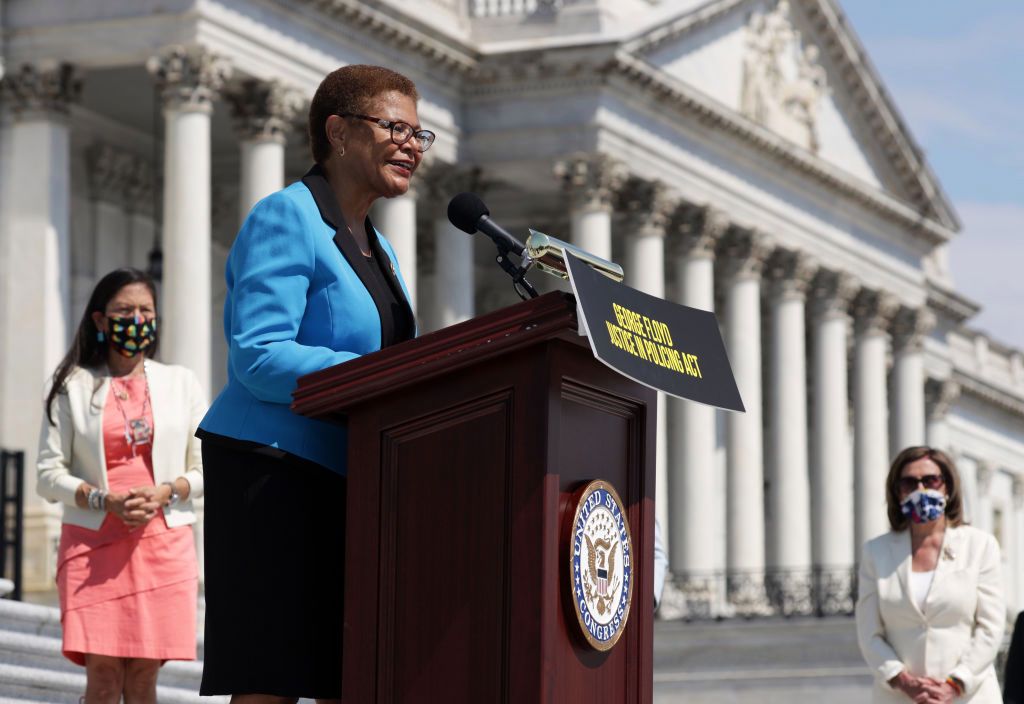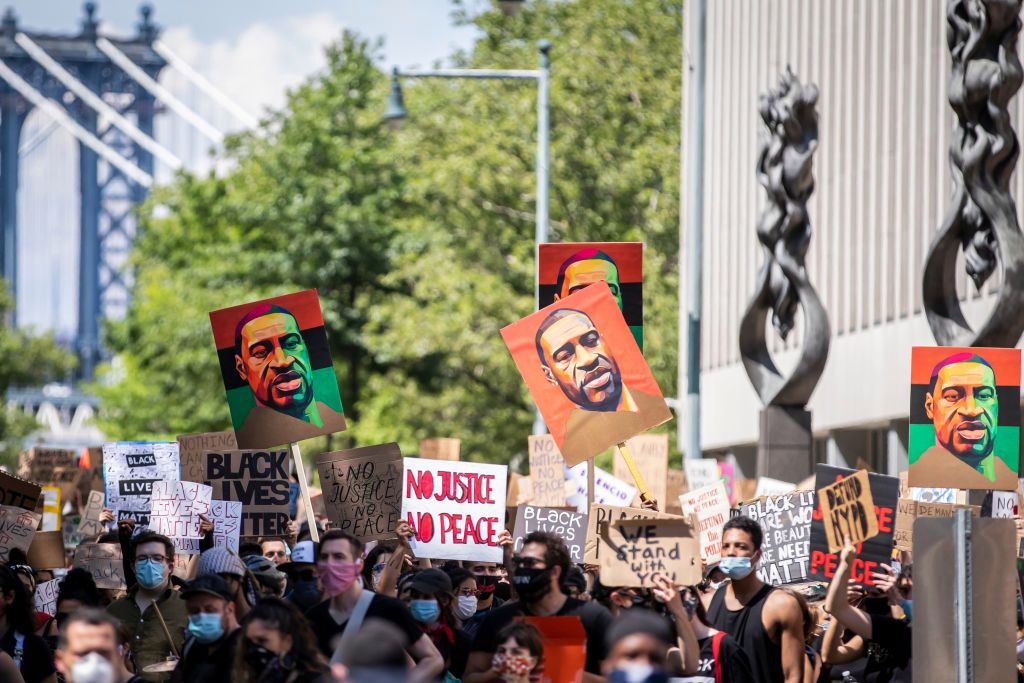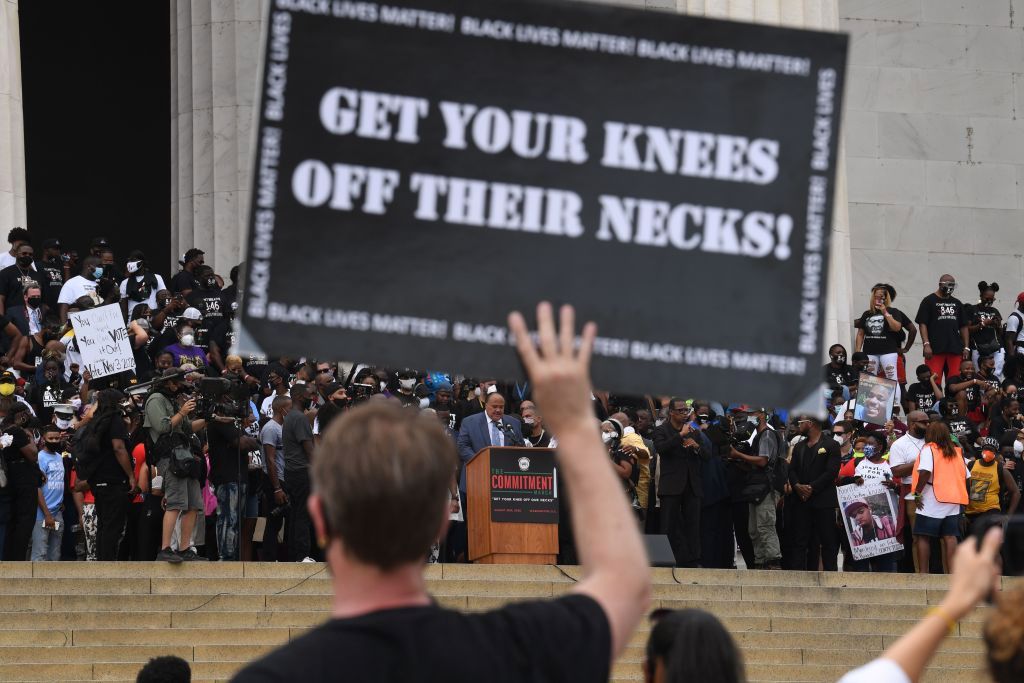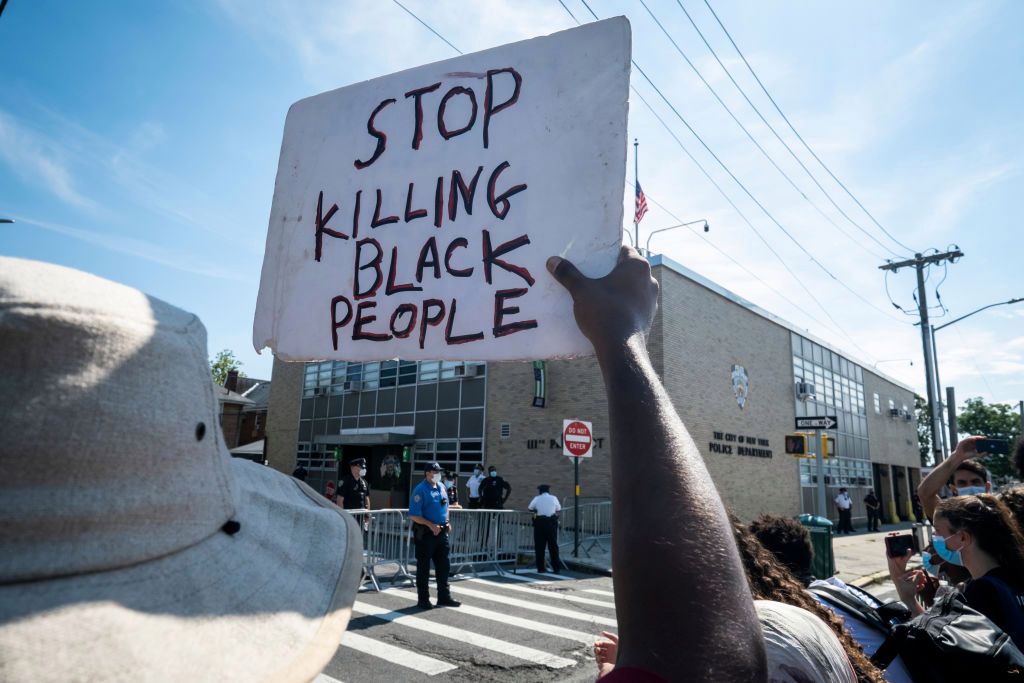
Rep. Karen Bass spoke about the George Floyd Justice in Policing Act ahead of a House vote on the legislation on June 25, 2020, at U.S. Capitol. | Source: Alex Wong / Getty
UPDATED: 9:55 p.m. ET, March 3
Original story: Feb. 24
The House voted Wednesday night to pass the George Floyd Justice In Policing Act, advancing the historic criminal justice reform to the Senate.
BREAKING: US House votes 220-212 to pass the George Floyd Justice in Policing Act; bill moves to Senate. pic.twitter.com/uPp6FxVcaV
— NBC News (@NBCNews) March 4, 2021
Civil rights leaders reacted with optimism at the prospects of being able to hold American law enforcement much more accountable for their actions than ever before.
“Addressing our nation’s violent history of discriminatory policing requires passing legislation that advances systemic reforms and meaningful accountability,” Damon Hewitt, Lawyers’ Committee for Civil Rights Under Law Executive Vice President, said in a statement. “With the House of Representatives’ passage of the George Floyd Justice in Policing Act (JPA), we are one step closer to beginning the work of transforming the culture of law enforcement and creating a stronger, more equitable justice system.”
Hewitt previously cited the “moral clarity” he said the law would bring with its enactment.
Ben Jealous, President of People For the American Way, said he was “frustrated” that the bill first passed by the House last year still is not law. However, he said he was left feeling more confident about it than before.
“There is still a long way to go to change the way public safety is provided in this country,” Jealous said in a statement. “But the George Floyd Justice in Policing Act breaks new ground on this front, and now the Senate too must pass it.”
Sherrilyn Ifill, NAACP Legal Defense & Educational Fund President & Director-Counsel, called the legislation “a vital public safety measure” and challenged the Senate to pass it so that President Joe Biden can sign it into law.
“While we are encouraged by tonight’s vote, our attention now turns to the United States Senate – where this same bill failed to advance last year,” Ifill, who previously compared the plight to get the George Floyd Justice in Policing Act passed to other historic legislation like the Civil Rights Act of 1965, said in a statement. “This cannot happen again. We must have nationwide standards for public safety and to improve our systems of accountability for law enforcement officers who commit misconduct in the ways that the federal government is uniquely empowered to do so.”
They were among the civil rights and social justice leaders who convened virtually last week to demand comprehensive congressional action to hold police accountable for their lethal and excessive actions that far too often involve Black lives.
They described the bill as a literal matter of life or death amid a national policing crisis. The House passing the legislation comes days ahead of the start of the Derek Chauvin murder trial for George Floyd s death murder trial in Minneapolis last Memorial Day.
Former California Rep. and current Housing and Urban Development Secretary Karen Bass in June unveiled the latest incarnation of the sweeping legislation aimed at reforming the ways in which police departments enforce the nation’s laws. Led by the Congressional Black Caucus the bill ambitiously aims to end police brutality, hold police accountable, improve transparency in policing and create meaningful, structural change when it comes to how law enforcement does their jobs.
If the bill gets signed into law, it would be the first-ever bold, comprehensive law enforcement accountability and transparency legislation.
Some of the notable portions of the bill include redefining malleable legal terms that impede the successful prosecution of killer cops as well as not offering any new federal funding for police departments.

Source: Ira L. Black – Corbis / Getty
Perhaps most significantly, the bill aims to hold police accountable by collecting data about officers accused of misconduct and worse behavior. It would establish a national registry that would attempt to address loopholes that allow cops who have been fired from one department to be hired by another.
There are other pertinent provisions the Justice in Policing Act covers, as well, including mandating the use of body cameras and dashboard cameras.
Last week, Wade Henderson, Leadership Conference on Civil and Human Rights Interim President & CEO, emphasized the need for a national database of police who have been disciplined for using excessive and/or lethal force to prevent them from being rehired in law enforcement capacities elsewhere. Mentioning how the bill bans no-knock warrants and excessive force maneuvers like chokeholds, Henderson admitted that while the bill may not be “perfect,” it still “represents meaningful progress” and should be passed swiftly by the House and Senate.

Source: ERIC BARADAT / Getty
“We cannot go through this cycle over and over again,” Henderson said. “Now is the time for those in our nation’s highest offices to take steps to end state-sanctioned violence” and bring structural change to end white supremacy.
Derrick Johnson, NAACP President & CEO, spoke about the abuse of power that law enforcement employs when it comes to accountability for their actions, especially as it relates to Black people.
“For African Americans, we have far too many individuals who take their oath of duty for granted … because they know they have a special privilege,” Johnson explained while alluding to a lack of police accountability.
“No person sworn to protect and uphold the law should operate above the law,” Johnson said before adding later: “They are able to do that because there is no accountability in place.”
Johnnetta Betsch Cole, National Council of Negro Women National Chair & President, made sure to point out that it’s not just Black men who are victimized by the police.
“There’s a very long history – and herstory – of violence against Black women, men and children by individual white supremacists and state-sanctioned brutality,” she said.
Cole ran down the very real history of police violence against Black people, going back hundreds of years from slavery and lynchings and enduring through to Reconstruction, Jim Crow and thriving until the current day.
“State-sanctioned violence against African Americans continues as some police – clearly not all – engage in excessive fore and actions that lead to the unwarranted death of Black women, Black men, and yes, Black children,” Cole added. “It will not cease until there are specific and concrete actions … to stop acts of misconduct and racial force in policing.”

Source: Ira L. Black – Corbis / Getty
Rev. Al Sharpton, National Action Network President, summed it all up succinctly: “This is not an anti-police bill; it’s an anti-bad policing bill.”
Marc H. Morial, National Urban League President & CEO, said, “the call from the people is loud and it’s clear — this is a moment like the ’60s where history will record: where did you stand?”
SEE ALSO:
Landmark Police Reform Bill Addresses Funding, Chokeholds, Lynching And Accountability
‘Morale Is Low’: Cops Wallow In Self-Pity As The Country Demands Better Policing That’s Not Racist
[ione_media_gallery id=”3440564″ overlay=”true”]
window.addEventListener(‘interaction’, function () {
setTimeout(function () {
var s = document.createElement(‘script’), el = document.getElementsByTagName(‘script’)[ 0 ];
s.async = true;
s.src = ‘https://platform.twitter.com/widgets.js’;
el.parentNode.insertBefore(s, el);
}, 1000)
});
